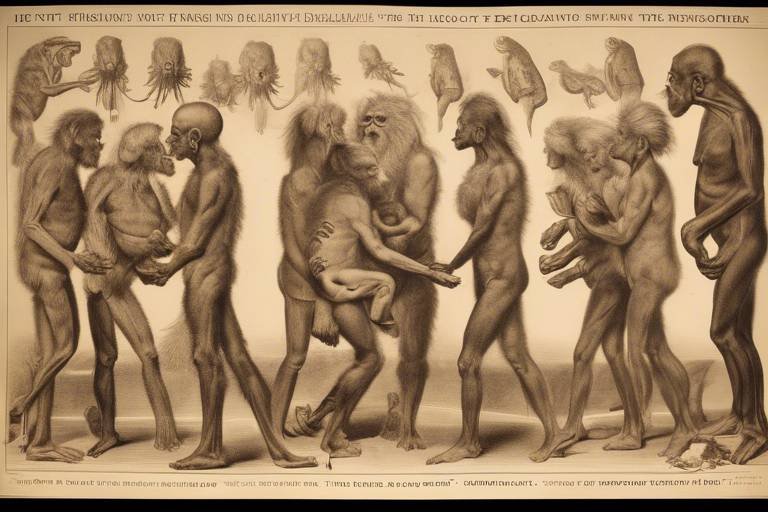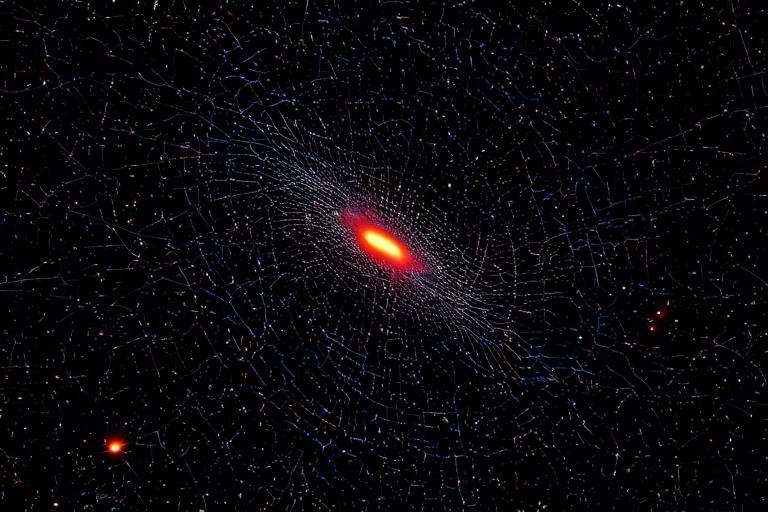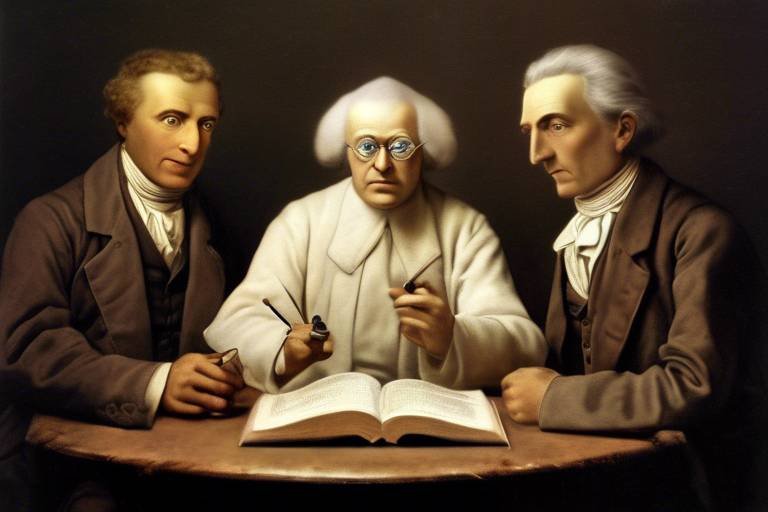The Mystic Link - Philosophy and Nuclear Science
In a world where the realms of philosophy and nuclear science seem to diverge, a fascinating intersection emerges, challenging our conventional understanding of both fields. At first glance, one might think of philosophy as an abstract discipline, steeped in metaphysical musings and ethical dilemmas, while nuclear science is often viewed as a concrete, empirical domain focused on the tangible manipulation of atomic particles. However, this article aims to unveil the intriguing connections that bind these two disciplines together, revealing how they can inform and enrich each other in profound ways.
Imagine philosophy as the lens through which we examine the fundamental questions of existence, knowledge, and morality, while nuclear science serves as a canvas illustrating the intricate dance of matter and energy at the atomic level. When these two fields converge, they create a rich tapestry of inquiry that not only deepens our understanding of the universe but also challenges us to confront the ethical implications of our scientific advancements.
As we embark on this exploration, we will delve into the philosophical foundations that underpin scientific inquiry, particularly in the context of nuclear science. We will examine the epistemological questions that arise when we probe the nature of reality through the lens of quantum mechanics, and we will also confront the moral dilemmas that accompany the development and application of nuclear technology. From the historical perspectives on nuclear ethics shaped by events like the atomic bombings to contemporary challenges such as waste disposal and non-proliferation, the interplay between philosophy and nuclear science is not only relevant but essential for navigating the complexities of our modern world.
Moreover, we will highlight the importance of interdisciplinary collaboration, showcasing how the integration of philosophical inquiry with nuclear science can lead to innovative solutions and a deeper comprehension of the challenges we face. This journey will not only illuminate the past but also offer a forward-looking perspective on how these two fields can work together to address emerging issues and shape future innovations.
So, buckle up as we embark on this intellectual adventure, where the mystic link between philosophy and nuclear science promises to unveil insights that are as profound as they are essential for our understanding of the world and our place within it.
- What is the relationship between philosophy and nuclear science?
Philosophy provides a framework for understanding the ethical and epistemological implications of nuclear science, while nuclear science offers concrete examples that challenge philosophical concepts. - How can interdisciplinary collaboration benefit both fields?
By integrating philosophical inquiry with scientific research, we can foster innovative solutions to complex problems and deepen our understanding of both disciplines. - What are some ethical dilemmas associated with nuclear science?
Ethical dilemmas include issues related to nuclear weapons development, waste disposal, and the balance between energy needs and environmental safety.

The Philosophical Foundations of Science
When we dive into the realm of science, particularly nuclear science, we find ourselves standing on the shoulders of giants—philosophers who have pondered the very nature of knowledge, existence, and reality. Philosophy serves as the bedrock upon which scientific inquiry is built, raising essential questions about how we know what we know. At its core, philosophy examines the epistemological and metaphysical foundations that underpin scientific practices. But what does this really mean in the context of nuclear science? Let's unravel this intriguing tapestry.
Epistemology, the study of knowledge, asks questions like: What constitutes knowledge? and How do we acquire it? In nuclear science, these questions are paramount. For instance, the reliability of data obtained from experiments can be challenged by the observer effect in quantum mechanics, where the act of observation alters the phenomenon being observed. This leads us to wonder: can we ever truly know the behavior of subatomic particles without affecting them? Such questions not only provoke thought but also challenge scientists to reconsider their methodologies and assumptions.
On the other hand, metaphysics delves into the nature of reality itself. In the context of nuclear science, this raises profound inquiries about the very fabric of existence. Are particles merely waves of probability, or do they possess a definitive state? These questions echo through the corridors of both philosophy and science, prompting a dialogue that enriches our understanding of both fields. For example, the concept of wave-particle duality forces us to rethink our conventional notions of reality, suggesting that what we perceive may not be the complete picture.
Moreover, the philosophical foundations of science extend beyond mere theory; they influence the ethical frameworks within which scientific inquiry operates. As we venture into the world of nuclear science, we must grapple with the implications of our discoveries and inventions. The balance between knowledge and responsibility becomes a central theme. Scientists are not just seekers of truth; they are also custodians of the consequences that their work may unleash upon society. This interplay between knowledge and ethics is a crucial aspect of the philosophical discourse surrounding nuclear science.
To illustrate the significance of these philosophical foundations, consider the following table that summarizes key philosophical questions and their relevance to nuclear science:
| Philosophical Question | Relevance to Nuclear Science |
|---|---|
| What is knowledge? | Understanding the reliability of experimental data in nuclear research. |
| What is reality? | Exploring wave-particle duality and its implications for atomic behavior. |
| What is the role of ethics in science? | Addressing the responsibilities scientists have in the face of nuclear technology. |
In conclusion, the philosophical foundations of science are not merely abstract concepts; they are vital to understanding the complexities of nuclear science. By engaging with these philosophical questions, we not only enhance our scientific practices but also ensure that we approach our discoveries with the necessary ethical considerations. As we continue to explore the universe at the atomic level, let us remember that the quest for knowledge is intertwined with the quest for wisdom.
- What is the relationship between philosophy and science? Philosophy provides the foundational questions and frameworks that guide scientific inquiry.
- How does epistemology relate to nuclear science? Epistemology questions the nature of knowledge and how it is obtained, which is crucial for interpreting data in nuclear experiments.
- Why is ethics important in nuclear science? Ethical considerations ensure that scientific advancements do not come at the expense of societal welfare and safety.

The Role of Ethics in Nuclear Science
Nuclear science stands at a fascinating crossroads where innovation and responsibility collide. As we delve deeper into the realms of atomic energy and nuclear technology, the ethical implications become increasingly significant. The very nature of nuclear science—its potential for both benefit and destruction—raises profound moral questions that scientists, policymakers, and society must grapple with. How do we balance the promise of clean energy against the risks of catastrophic accidents? What responsibilities do scientists have in ensuring their discoveries are used for the greater good?
At the heart of these discussions lies the concept of ethical responsibility. Scientists working in nuclear fields must consider not only the technical aspects of their work but also the broader impacts on humanity and the environment. This involves a deep understanding of the potential consequences of their research and the technologies they develop. For instance, the debate surrounding nuclear waste disposal is not merely a technical challenge; it is an ethical dilemma that poses questions about our obligations to future generations. Should we prioritize immediate energy needs over the long-term safety of our planet?
Moreover, the ethical landscape of nuclear science is shaped by historical events that have left indelible marks on public perception and policy. The atomic bombings during World War II serve as a stark reminder of nuclear technology's destructive power. They force us to confront uncomfortable truths about the responsibilities of scientists and the moral implications of their work. In this context, the ethical considerations extend beyond the laboratory; they encompass societal impacts, international relations, and the very fabric of human life.
To understand the ethical implications of nuclear science, we must look at the past. Events such as the atomic bombings of Hiroshima and Nagasaki, as well as the Chernobyl and Fukushima disasters, have profoundly influenced the discourse on nuclear ethics. These occurrences have prompted society to ask critical questions about the morality of using nuclear technology. What lessons can we learn from these tragedies? How can we prevent history from repeating itself?
The Manhattan Project, which led to the development of the atomic bomb, is a prime example of the ethical dilemmas faced by scientists. Researchers were compelled to weigh their scientific pursuits against the potential for mass destruction. Many grappled with the notion of whether they were justified in creating a weapon of such devastating power. This internal conflict highlights a broader ethical question: to what extent should scientists be held accountable for the consequences of their inventions?
As we advance into the 21st century, new ethical challenges arise in the field of nuclear science. Issues such as waste disposal, non-proliferation, and the balance between energy needs and safety are critical areas of concern. For example, the long-term storage of nuclear waste raises questions about our responsibility to future generations. Are we doing enough to ensure that our energy solutions today do not create insurmountable problems tomorrow?
In addition, the global landscape of nuclear weapons continues to evolve, prompting discussions about non-proliferation and disarmament. The ethical implications of maintaining nuclear arsenals for national security must be critically examined. Is it ethical to threaten annihilation as a means of ensuring peace? These dilemmas require a collaborative approach, combining insights from both nuclear science and philosophy to navigate the complex moral terrain.
Ultimately, the role of ethics in nuclear science is not just an academic exercise; it is a vital component of how we approach the future of energy and technology. As we stand on the brink of new discoveries, the fusion of ethical inquiry with scientific advancement will be crucial in shaping a sustainable and responsible future.
- What are the main ethical concerns in nuclear science? The primary ethical concerns include the responsibility of scientists, the implications of nuclear waste disposal, and the moral dilemmas surrounding nuclear weapons.
- How did historical events influence nuclear ethics? Historical events such as the atomic bombings and nuclear accidents have shaped public perception and ethical discussions, highlighting the potential consequences of nuclear technology.
- What role do scientists play in ensuring ethical practices in nuclear science? Scientists have a responsibility to consider the broader implications of their work and to engage in ethical discussions that inform their research and applications.

Historical Perspectives on Nuclear Ethics
The ethical landscape of nuclear science is profoundly shaped by historical events that have left indelible marks on society's conscience. One of the most significant events in this context is the use of atomic bombs on Hiroshima and Nagasaki during World War II. These bombings not only led to unprecedented destruction and loss of life but also ignited a fierce debate about the morality of using such devastating technology. Was it justified to end the war at such a high human cost? This question continues to haunt ethicists, historians, and scientists alike, as they grapple with the implications of these actions.
In the aftermath of the bombings, the world witnessed a shift in how nuclear technology was perceived. Initially viewed as a means to achieve military superiority, nuclear science soon became synonymous with ethical dilemmas. The Cold War era further complicated this narrative, as nations raced to develop and stockpile nuclear weapons, raising concerns about the potential for catastrophic conflict. The ethical implications of deterrence strategies and the concept of mutually assured destruction (MAD) became central themes in philosophical discussions surrounding nuclear ethics.
Moreover, nuclear accidents, such as the Chernobyl disaster in 1986 and the Fukushima meltdown in 2011, have added layers of complexity to the ethical discourse. These incidents not only highlighted the risks associated with nuclear energy but also underscored the responsibilities of scientists and policymakers to prioritize safety and public welfare. The fallout from these disasters prompted a reevaluation of nuclear energy's role in society and sparked debates about the ethical obligations of those involved in nuclear research and development.
In examining these historical events, we can identify several key ethical questions that persist today:
- What responsibilities do scientists have in preventing the misuse of nuclear technology?
- How should society balance the benefits of nuclear energy against the potential risks?
- What moral obligations do nations have to ensure the safe handling and disposal of nuclear waste?
These questions are not merely academic; they resonate with the very fabric of our existence as we navigate the complexities of a world where nuclear technology plays a critical role. As we reflect on the historical perspectives of nuclear ethics, it becomes clear that the lessons learned from the past are essential for shaping a more responsible and ethical approach to nuclear science in the future.
- What are the main ethical concerns regarding nuclear weapons? The primary concerns include the justification for their use, the potential for mass destruction, and the moral implications of deterrence strategies.
- How have nuclear accidents influenced public perception of nuclear energy? Nuclear accidents have raised significant safety concerns, leading to increased scrutiny and calls for stricter regulations in the nuclear industry.
- What role do scientists play in nuclear ethics? Scientists are responsible for conducting research ethically, ensuring safety, and communicating potential risks to the public and policymakers.

The Manhattan Project's Ethical Dilemmas
The Manhattan Project, a monumental undertaking during World War II, was not just a race against time to develop nuclear weapons; it was also a crucible of ethical dilemmas that would haunt scientists and policymakers for decades. Imagine being part of a team tasked with creating a device that could potentially end millions of lives. The weight of such responsibility is staggering, and it raises profound questions about the moral implications of scientific discovery. Was it justifiable to pursue nuclear weapons for the sake of national security, even if it meant sacrificing innocent lives? This dilemma is at the heart of the ethical discourse surrounding the Manhattan Project.
As scientists worked feverishly in laboratories, they faced a series of moral quandaries. One of the most pressing issues was the decision to prioritize military objectives over humanitarian considerations. The project was shrouded in secrecy, and many of the scientists were unaware of the full implications of their work until it was too late. The ethical implications of this lack of transparency cannot be overstated. How can one justify the creation of a weapon of mass destruction without fully understanding its consequences? This question looms large as we reflect on the ethical landscape of the project.
Moreover, the project raised questions about the role of scientists in society. Should scientists merely follow orders from military leaders, or do they have a moral obligation to question the ethical implications of their work? This tension between duty and conscience is a recurring theme in the narrative of the Manhattan Project. Many scientists, including renowned physicist J. Robert Oppenheimer, grappled with their roles as both creators and potential destroyers. Oppenheimer famously quoted the Bhagavad Gita after witnessing the first successful test of the atomic bomb, stating, "Now I am become Death, the destroyer of worlds." This chilling acknowledgment reflects the deep moral conflict faced by those involved in the project.
The consequences of the Manhattan Project were not limited to the immediate aftermath of the bombings in Hiroshima and Nagasaki. The ethical implications extend into the present day, as the world continues to grapple with nuclear proliferation and the potential for catastrophic warfare. To understand these dilemmas, we can categorize them into several key areas:
- Military vs. Humanitarian Objectives: The conflict between national security and the preservation of human life.
- Transparency and Responsibility: The ethical responsibility of scientists to inform the public and policymakers about the implications of their discoveries.
- Long-term Consequences: The ongoing impact of nuclear weapons on global security and ethics.
These dilemmas underscore the importance of ethical reflection in scientific endeavors. The Manhattan Project serves as a stark reminder that scientific progress must be accompanied by a robust ethical framework. As we continue to advance in nuclear science, it is essential to learn from the past and ensure that ethical considerations remain at the forefront of scientific inquiry.
What was the primary goal of the Manhattan Project?
The primary goal of the Manhattan Project was to develop nuclear weapons during World War II to ensure military superiority and bring a swift end to the war.
What ethical dilemmas did scientists face during the Manhattan Project?
Scientists faced ethical dilemmas regarding the justification of creating weapons of mass destruction, the lack of transparency about the implications of their work, and the conflict between military orders and moral responsibility.
How has the Manhattan Project influenced modern nuclear ethics?
The Manhattan Project has profoundly influenced modern nuclear ethics by highlighting the need for ethical considerations in scientific research, particularly regarding the consequences of nuclear proliferation and warfare.

Contemporary Ethical Challenges
The realm of nuclear science is not just a playground for physicists and engineers; it is also a complex ethical landscape that we must navigate with care. As we delve deeper into the contemporary ethical challenges that arise from nuclear technology, we find ourselves grappling with questions that are as profound as they are pressing. One of the most significant issues is the dilemma surrounding waste disposal. Nuclear waste, which remains hazardous for thousands of years, poses a monumental challenge for scientists and policymakers alike. How do we ensure the safety of future generations while managing the byproducts of our current technological advancements?
Another pressing concern is non-proliferation. The fear of nuclear weapons falling into the wrong hands is a real and present danger. Countries around the world are constantly engaged in discussions about how to prevent the spread of nuclear weapons technology. This brings us to the moral question of whether it is justifiable to possess such destructive capabilities, even for the sake of national security. The balance between maintaining safety and ensuring peace is a tightrope that many governments find difficult to walk.
Moreover, the ongoing debate about the balance between energy needs and safety cannot be overlooked. As the world grapples with climate change and seeks alternative energy sources, nuclear power is often hailed as a viable option. Yet, the catastrophic potential of nuclear accidents, as seen in Chernobyl and Fukushima, raises serious ethical questions. Should we invest in a technology that carries such high stakes? Or should we prioritize renewable energy sources that may be less risky?
These challenges are not just theoretical; they impact real lives. The decisions made today regarding nuclear science will resonate for generations. To illustrate the complexities involved, consider the following table that outlines some of the key contemporary ethical challenges in nuclear science:
| Challenge | Description | Ethical Considerations |
|---|---|---|
| Nuclear Waste Disposal | Management of hazardous waste that remains dangerous for thousands of years. | Responsibility towards future generations and environmental sustainability. |
| Non-Proliferation | Preventing the spread of nuclear weapons technology to rogue states and terrorist organizations. | National security vs. global safety and moral implications of deterrence. |
| Energy vs. Safety | Balancing the need for energy production with the risks of nuclear accidents. | Ethical responsibility to protect public health and the environment. |
In conclusion, the contemporary ethical challenges in nuclear science are multifaceted and require a thoughtful approach. As we move forward, it is essential that scientists, ethicists, and policymakers engage in open dialogues to address these issues. The intersection of ethics and nuclear science is not just an academic exercise; it is a crucial conversation that will shape the future of our society.
- What are the main ethical concerns regarding nuclear waste?
The primary concerns include the long-term safety of waste storage, environmental impact, and responsibilities to future generations.
- How does non-proliferation affect global security?
Non-proliferation efforts aim to prevent the spread of nuclear weapons, which is essential for maintaining international peace and security.
- What is the ethical dilemma of nuclear energy?
The dilemma lies in balancing the urgent need for energy against the risks posed by potential nuclear disasters and waste management.

Philosophical Implications of Quantum Mechanics
Quantum mechanics, often regarded as the cornerstone of modern physics, challenges our traditional notions of reality and existence. It opens up a Pandora's box of philosophical questions that can leave even the most seasoned thinkers scratching their heads. For instance, consider the concept of superposition, where particles can exist in multiple states at once. This phenomenon begs the question: if reality is not as fixed as we perceive it, what does that mean for our understanding of existence itself? It’s as if the universe is playing a cosmic game of hide-and-seek, where the rules are constantly changing.
Moreover, the principle of entanglement—where particles become interconnected in such a way that the state of one instantly influences the state of another, regardless of distance—raises profound questions about causality and the nature of information. Can we truly claim to understand the universe if the rules of engagement seem to defy our conventional logic? This interconnectedness suggests that our perception of separateness is merely an illusion, prompting us to rethink our place in the cosmos.
To dive deeper, let’s consider the implications of the observer effect, where the act of observation alters the state of a quantum system. This notion has led some philosophers to propose that consciousness plays a fundamental role in shaping reality. If our mere act of observation can influence outcomes, what does that say about the relationship between the observer and the observed? Are we active participants in the unfolding of the universe, or merely passive spectators? Such questions push the boundaries of both science and philosophy, inviting a dialogue that transcends disciplinary divides.
In exploring these philosophical implications, we can draw parallels to existentialism, where the focus is on individual experience and the search for meaning in a seemingly indifferent universe. Just as quantum mechanics reveals a world that is inherently unpredictable and interconnected, existentialism confronts us with the responsibility of creating our own meaning amidst chaos. It’s a dance between the known and the unknown, where both science and philosophy grapple with the fundamental questions of existence.
In conclusion, the philosophical implications of quantum mechanics extend far beyond the laboratory. They challenge us to reconsider our assumptions about reality, consciousness, and the very fabric of existence. As we continue to unlock the mysteries of the quantum realm, we must also engage in the philosophical discourse that accompanies these discoveries. This interplay between quantum mechanics and philosophy not only enriches our understanding but also invites us to ponder the deeper questions that define our human experience.
- What is quantum mechanics? Quantum mechanics is a fundamental theory in physics that describes the physical properties of nature at the scale of atoms and subatomic particles.
- How does quantum mechanics challenge traditional philosophy? It challenges traditional philosophy by questioning the nature of reality, causality, and the role of the observer in shaping outcomes.
- What is the observer effect? The observer effect refers to changes that the act of observation can make on a phenomenon being observed, particularly in quantum mechanics.
- How does quantum entanglement work? Quantum entanglement is a phenomenon where two or more particles become linked, such that the state of one particle instantly influences the state of another, regardless of the distance separating them.

Interdisciplinary Approaches to Knowledge
In today’s rapidly evolving world, the boundaries between disciplines are becoming increasingly blurred. The intersection of philosophy and nuclear science is a prime example of how interdisciplinary approaches can lead to richer understanding and innovation. By combining the analytical rigor of philosophy with the empirical methodologies of nuclear science, we can tackle some of the most pressing challenges of our time. This fusion not only enhances our comprehension of complex concepts but also fosters a more holistic view of knowledge.
One of the most fascinating aspects of this interdisciplinary collaboration is the way it encourages us to ask deeper questions. For instance, while nuclear science provides us with the technical know-how to harness atomic energy, philosophy prompts us to ponder the ethical implications of such power. Questions like “What are our responsibilities as scientists?” or “How do we ensure the safe use of nuclear technology?” become central to the discourse. This kind of inquiry can lead to groundbreaking advancements that are not only scientifically sound but also ethically grounded.
Furthermore, interdisciplinary approaches allow for a more comprehensive exploration of knowledge. By integrating philosophical frameworks, scientists can gain insights into the epistemological foundations of their work. This means looking beyond the data and experiments to consider the broader implications of their findings. For example, the concept of uncertainty in quantum mechanics challenges traditional notions of determinism, compelling scientists to reconsider how they interpret their results. This shift in perspective can lead to innovative solutions that address both scientific and societal needs.
To illustrate the power of interdisciplinary research, let’s take a look at some noteworthy case studies:
| Project Name | Description | Outcome |
|---|---|---|
| The Human Genome Project | A collaborative research initiative to map all the genes of the human species. | Revolutionized genetics and raised ethical questions about genetic engineering. |
| International Atomic Energy Agency (IAEA) | A global organization that promotes the peaceful use of nuclear energy. | Fosters international cooperation and addresses safety and security concerns. |
These case studies exemplify how interdisciplinary collaboration can lead to significant advancements while also addressing ethical considerations. By engaging philosophers, scientists, and ethicists in dialogue, we create a vibrant ecosystem of knowledge that can tackle complex problems from multiple angles.
Looking to the future, the potential for interdisciplinary collaboration between philosophy and nuclear science is immense. As we face new challenges, such as climate change and energy demands, the need for innovative solutions becomes ever more pressing. By continuing to foster dialogue and collaboration between these fields, we can create a more sustainable and ethically responsible future. Imagine a world where scientists not only understand the mechanics of nuclear energy but also grasp the profound ethical implications of their work. This is the power of interdisciplinary approaches—a bridge that connects knowledge, ethics, and innovation.
- What is the importance of interdisciplinary approaches?
Interdisciplinary approaches allow for a more comprehensive understanding of complex issues by integrating different perspectives and methodologies. - How can philosophy inform nuclear science?
Philosophy can provide ethical frameworks and critical thinking skills that help scientists navigate the moral implications of their work. - What are some examples of successful interdisciplinary projects?
Projects like the Human Genome Project and initiatives by the IAEA showcase how collaboration can lead to significant advancements.

Case Studies in Interdisciplinary Research
When we think about the fusion of philosophy and nuclear science, it might seem like an odd pairing at first glance. However, history has shown us that the most profound advancements often emerge at the intersection of diverse fields. One compelling case study that exemplifies this is the collaboration between philosophers and nuclear physicists during the development of nuclear energy. This partnership not only advanced scientific understanding but also raised critical questions about the ethical implications of such powerful technology.
Take, for instance, the work of Dr. Robert Oppenheimer, a key figure in the Manhattan Project. Oppenheimer was not just a physicist; he was also deeply influenced by philosophical thought. His reflections on the moral weight of creating the atomic bomb led him to engage with ethical philosophers, prompting discussions that would shape the discourse around nuclear weapons for decades to come. This collaboration resulted in a more nuanced understanding of the responsibilities that come with scientific discovery.
Another fascinating example can be found in the realm of nuclear waste management. Researchers have sought the insights of philosophers to tackle the complex ethical questions surrounding the long-term storage of radioactive waste. The challenge is not merely technical; it involves considering the impacts on future generations and the environment. A notable project in this area is the Yucca Mountain Project, where scientists and ethicists worked together to address the implications of storing nuclear waste in a geological repository. Through their collaboration, they developed frameworks that consider both the scientific feasibility and the ethical ramifications of their decisions.
Moreover, interdisciplinary research has also been pivotal in addressing nuclear non-proliferation. Scholars in philosophy have teamed up with political scientists and nuclear experts to create comprehensive strategies that not only focus on the technical aspects of nuclear weapons but also on the ethical and political dimensions. This collaboration has led to initiatives that promote global security while respecting national sovereignty, demonstrating how philosophical inquiry can provide valuable insights into real-world challenges.
In summary, the case studies of interdisciplinary research in the fields of nuclear science and philosophy illustrate that the merging of these disciplines can yield profound insights. By embracing a collaborative approach, we can confront the ethical dilemmas posed by nuclear technology and work toward solutions that are not only scientifically sound but also morally responsible. As we look to the future, the potential for such collaborations is immense, promising to enhance our understanding of both the universe and our place within it.
- What is interdisciplinary research?
Interdisciplinary research involves integrating knowledge and methods from different disciplines to address complex problems. - How can philosophy contribute to nuclear science?
Philosophy can provide ethical frameworks and critical perspectives that help guide the responsible development and application of nuclear technology. - What are some ethical concerns in nuclear science?
Key ethical concerns include the risks of nuclear proliferation, the management of nuclear waste, and the moral implications of nuclear energy versus weapons.

The Future of Interdisciplinary Collaboration
As we stand on the precipice of a new era in both philosophical inquiry and nuclear science, the potential for interdisciplinary collaboration has never been more promising. Imagine a world where the boundaries between disciplines dissolve, allowing for a rich tapestry of knowledge that can tackle the most pressing challenges of our time. The future of interdisciplinary collaboration is not just a dream; it's a necessity for addressing complex issues that require multifaceted approaches.
One of the most exciting prospects of this collaboration is the development of innovative solutions to global problems such as climate change, energy sustainability, and nuclear safety. By merging the analytical rigor of nuclear science with the ethical considerations of philosophy, we can create frameworks that ensure technological advancements are both effective and responsible. For example, consider the ongoing discussions around nuclear energy as a viable alternative to fossil fuels. Philosophers can help shape the discourse around the ethical implications of nuclear waste, while scientists can provide the technical expertise needed to develop safer disposal methods.
Moreover, the integration of philosophical thought into scientific research can lead to new paradigms of understanding. As quantum mechanics continues to challenge our traditional notions of reality, philosophers can offer insights that help scientists navigate these uncharted waters. This symbiotic relationship not only enriches scientific inquiry but also deepens our understanding of existence itself. The future may hold groundbreaking discoveries that arise from this collaboration, reshaping our worldview in ways we cannot yet imagine.
To facilitate this interdisciplinary synergy, educational institutions must adapt their curricula to foster collaboration from an early stage. Programs that encourage students to engage in both scientific and philosophical studies will cultivate a generation of thinkers who can bridge the gap between these fields. Imagine students not only learning about the mechanics of nuclear reactors but also grappling with the ethical implications of their use in society. This holistic education will prepare them to tackle future challenges with a well-rounded perspective.
Furthermore, collaborative research initiatives should be prioritized. Funding bodies and research institutions need to recognize the value of interdisciplinary projects and provide the necessary resources to support them. By investing in teams that include both philosophers and scientists, we can ensure that diverse viewpoints are represented in the decision-making processes that shape our future. This can lead to more robust and ethically sound outcomes, ultimately benefiting society as a whole.
In conclusion, the future of interdisciplinary collaboration between philosophy and nuclear science is bright and full of potential. As we embrace this synergy, we open the door to innovative solutions, deeper understanding, and a more ethical approach to scientific advancement. The challenges we face are complex and multifaceted, but by working together, we can create a future that is not only technologically advanced but also morally sound.
- What is interdisciplinary collaboration? Interdisciplinary collaboration refers to the integration of knowledge, methodologies, and perspectives from different academic disciplines to address complex problems.
- How can philosophy contribute to nuclear science? Philosophy can provide ethical frameworks and critical thinking skills that help scientists navigate moral dilemmas associated with nuclear technology.
- Why is it important to combine different fields of study? Combining different fields allows for a more comprehensive understanding of issues and fosters innovative solutions that consider multiple perspectives.
- What are some examples of successful interdisciplinary projects? Projects that focus on renewable energy, climate change, and nuclear safety often involve collaboration between scientists, ethicists, and policymakers.
Frequently Asked Questions
- What is the connection between philosophy and nuclear science?
Philosophy and nuclear science intersect in fascinating ways, as philosophical inquiries into ethics, reality, and knowledge can profoundly influence scientific practices and interpretations. By examining the underlying principles of both fields, we can gain deeper insights into the implications of nuclear technology and its impact on society.
- How does ethics play a role in nuclear science?
Ethics is crucial in nuclear science, as it addresses the moral responsibilities of scientists and the societal implications of their work. Issues such as the development of nuclear weapons, waste disposal, and energy safety raise significant ethical dilemmas that require careful consideration and dialogue among scientists, ethicists, and policymakers.
- What historical events have influenced nuclear ethics?
Historical events like the atomic bombings in Hiroshima and Nagasaki, along with nuclear accidents such as Chernobyl and Fukushima, have profoundly shaped the ethical discussions surrounding nuclear science. These incidents highlight the potential consequences of nuclear technology and the urgent need for ethical frameworks to guide scientific research and application.
- What are some contemporary ethical challenges in nuclear science?
Today, nuclear science faces various ethical challenges, including the safe disposal of nuclear waste, non-proliferation of nuclear weapons, and balancing energy needs with safety concerns. These issues require ongoing ethical scrutiny and innovative solutions to ensure responsible use of nuclear technology.
- How does quantum mechanics challenge traditional philosophy?
Quantum mechanics introduces concepts that challenge our traditional notions of reality, causality, and existence. This shift in understanding forces philosophers to reconsider fundamental questions about the nature of the universe, consciousness, and the limits of human knowledge, particularly in the context of nuclear science.
- What are some examples of interdisciplinary research between philosophy and nuclear science?
Interdisciplinary research often includes collaborative projects that integrate philosophical inquiry with nuclear science, such as studies on the ethical implications of nuclear energy policies or the philosophical analysis of scientific theories in nuclear physics. These collaborations can lead to groundbreaking insights and innovative solutions to complex problems.
- What does the future hold for interdisciplinary collaboration in these fields?
The future of interdisciplinary collaboration between philosophy and nuclear science looks promising, as emerging challenges like climate change and global security necessitate innovative approaches. By fostering dialogue and cooperation, these fields can work together to address pressing issues and inform public policy for a safer and more sustainable future.



















